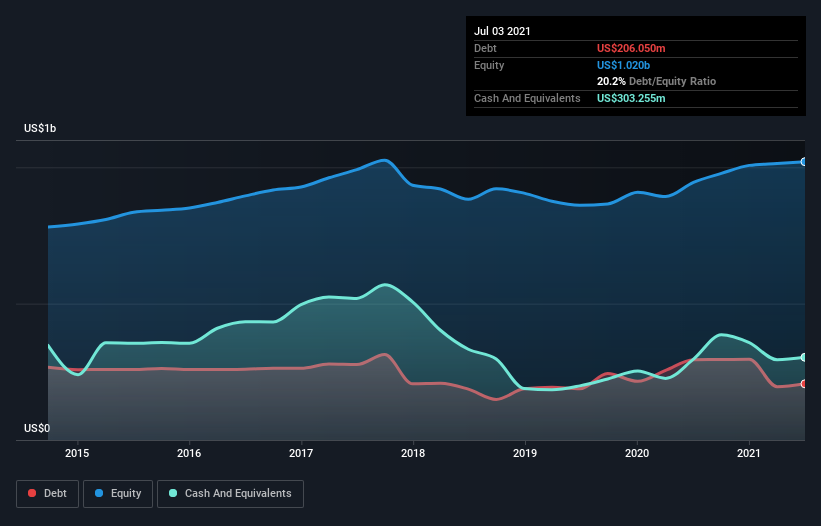Plexus (NASDAQ:PLXS) Seems To Use Debt Rather Sparingly
Warren Buffett famously said, 'Volatility is far from synonymous with risk.' When we think about how risky a company is, we always like to look at its use of debt, since debt overload can lead to ruin. We note that Plexus Corp. (NASDAQ:PLXS) does have debt on its balance sheet. But should shareholders be worried about its use of debt?
When Is Debt Dangerous?
Debt and other liabilities become risky for a business when it cannot easily fulfill those obligations, either with free cash flow or by raising capital at an attractive price. Part and parcel of capitalism is the process of 'creative destruction' where failed businesses are mercilessly liquidated by their bankers. However, a more frequent (but still costly) occurrence is where a company must issue shares at bargain-basement prices, permanently diluting shareholders, just to shore up its balance sheet. Having said that, the most common situation is where a company manages its debt reasonably well - and to its own advantage. When we think about a company's use of debt, we first look at cash and debt together.
See our latest analysis for Plexus
What Is Plexus's Debt?
You can click the graphic below for the historical numbers, but it shows that Plexus had US$206.1m of debt in July 2021, down from US$294.5m, one year before. But on the other hand it also has US$303.3m in cash, leading to a US$97.2m net cash position.
How Strong Is Plexus' Balance Sheet?
The latest balance sheet data shows that Plexus had liabilities of US$1.00b due within a year, and liabilities of US$299.4m falling due after that. Offsetting these obligations, it had cash of US$303.3m as well as receivables valued at US$583.4m due within 12 months. So its liabilities outweigh the sum of its cash and (near-term) receivables by US$414.4m.
Of course, Plexus has a market capitalization of US$2.55b, so these liabilities are probably manageable. Having said that, it's clear that we should continue to monitor its balance sheet, lest it change for the worse. While it does have liabilities worth noting, Plexus also has more cash than debt, so we're pretty confident it can manage its debt safely.
Also positive, Plexus grew its EBIT by 27% in the last year, and that should make it easier to pay down debt, going forward. When analysing debt levels, the balance sheet is the obvious place to start. But ultimately the future profitability of the business will decide if Plexus can strengthen its balance sheet over time. So if you're focused on the future you can check out this free report showing analyst profit forecasts.
But our final consideration is also important, because a company cannot pay debt with paper profits; it needs cold hard cash. Plexus may have net cash on the balance sheet, but it is still interesting to look at how well the business converts its earnings before interest and tax (EBIT) to free cash flow, because that will influence both its need for, and its capacity to manage debt. Over the most recent three years, Plexus recorded free cash flow worth 65% of its EBIT, which is around normal, given free cash flow excludes interest and tax. This cold hard cash means it can reduce its debt when it wants to.
Summing up
While Plexus does have more liabilities than liquid assets, it also has net cash of US$97.2m. And it impressed us with its EBIT growth of 27% over the last year. So is Plexus's debt a risk? It doesn't seem so to us. Another factor that would give us confidence in Plexus would be if insiders have been buying shares: if you're conscious of that signal too, you can find out instantly by clicking this link.
Of course, if you're the type of investor who prefers buying stocks without the burden of debt, then don't hesitate to discover our exclusive list of net cash growth stocks, today.
This article by Simply Wall St is general in nature. We provide commentary based on historical data and analyst forecasts only using an unbiased methodology and our articles are not intended to be financial advice. It does not constitute a recommendation to buy or sell any stock, and does not take account of your objectives, or your financial situation. We aim to bring you long-term focused analysis driven by fundamental data. Note that our analysis may not factor in the latest price-sensitive company announcements or qualitative material. Simply Wall St has no position in any stocks mentioned.
Have feedback on this article? Concerned about the content? Get in touch with us directly. Alternatively, email editorial-team (at) simplywallst.com.

